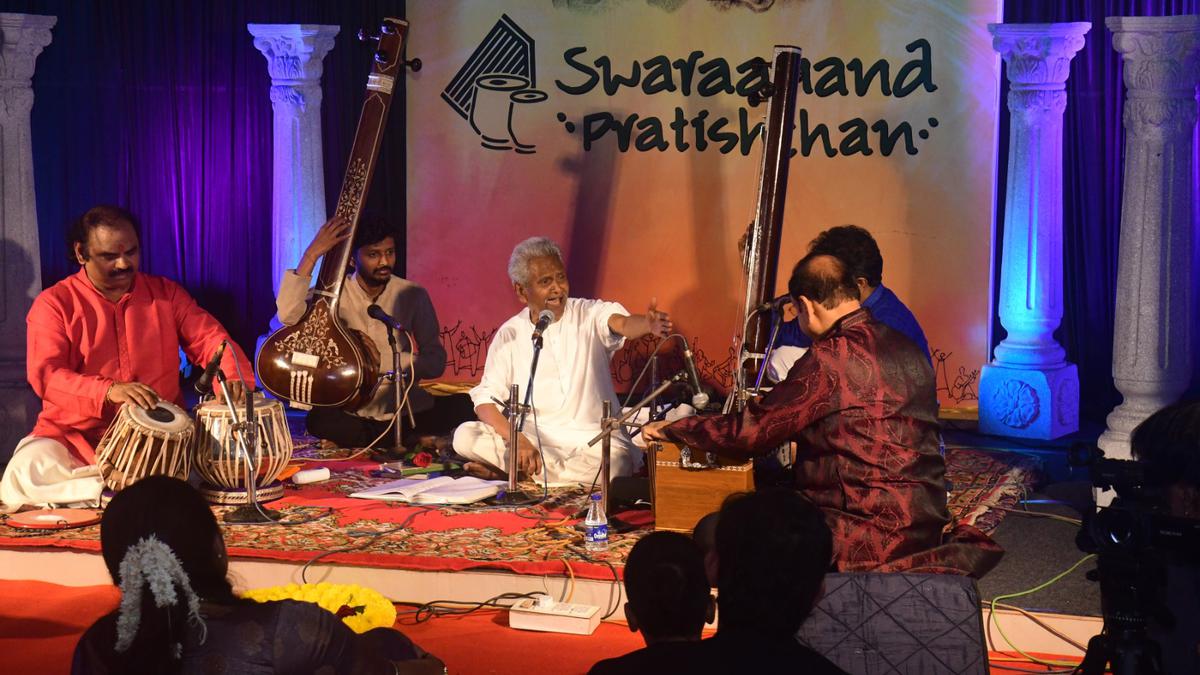
All night music festival | Sublime performances keep audience spellbound
The Hindu
All night music festival in Mangaluru featuring senior & budding musicians, with vocalist Ravikiran Manipal starting the last concert.
No composition than “Manava Kaahe Dhoond Phire Maati Ke Math Mandir Mein”, wherein lyricist asks person not to search for God in places of worship, looked apt for vocalist Ravikiran Manipal to start his concert on December 17 morning, which was last of six concerts of the all night music festival held at the BEM School auditorium.
Mr. Manipal started his sublime one-hour long concert at 6.30 a.m. on December 17 with this composition of his guru set to Raag Lalath in the slow paced vilambit taal. This was followed by another composition “Bhora Bhayi Shyama Nahi Aaye” set fast paced ‘dhurt’ taal. He then sung his own composition on his guru, which was followed by popular composition “Jogiya Morey Ghar Aaye”. He ended his concert at 7.30 a.m. by presenting a soulful composition on the Lord.
Mr. Manipal was ably accompanied by senior tabla player Pandit Aravind Kumar Azad and Dnyaneshwar Sonawane on harmonium.
The refurbished old auditorium of BEM school on Car Street, which looked similar to Nadgirwada in Kundagol of Dharwad — the residence of Kirana Gharana doyen Sawai Gandharva, served as an apt venue for the music festival organised by Swaraanand Sangeet Pratishthan.
The musical festival started with concert by 79-year-old Pandit Somnath Mardur, a disciple of maestro Basavaraj Rajguru, at 9 p.m on Saturday. He started with composition “Tu Rasa Kaanare” set to Raag Durga. This was followed a Tarana. He ended with soulful presentation of Purandaradasa composition “Govinda ninna aananda, sakala saadhanavo ninnaananda”.
The next was solo harmonium concert by Pandit Sudhir Nayak. He started with composition “Suna Muraliki” set to Raag Jaijaivanti, which was followed by “Mukuta Vaaro Saavaro” set to Raag Keervani. He ended with Thumri set to Raag Pilu.
The third concert was vocal recital by Apoorva Gokhale and Pallavi Joshi that started at 1 a.m. The two started with “Baname Charaawat Gaiyya” set to Raag Malgunji, followed by fast paced Dhrut composition “Rainakari Daraawana Laagiri”. The two then presented “Ban Mora Pyara”, followed by “Naina Nahi Maane Darase”. They ended with bandish “Brahma Thuma Vishnu Thuma Shambhu Mahadeva”. The two were suppported by Gurumurthy Vaidya on Tabla and Pandit Sudhir Nayak on Harmonium.

“Writing, in general, is a very solitary process,” says Yauvanika Chopra, Associate Director at The New India Foundation (NIF), which, earlier this year, announced the 12th edition of its NIF Book Fellowships for research and scholarship about Indian history after Independence. While authors, in general, are built for it, it can still get very lonely, says Chopra, pointing out that the fellowship’s community support is as valuable as the monetary benefits it offers. “There is a solid community of NIF fellows, trustees, language experts, jury members, all of whom are incredibly competent,” she says. “They really help make authors feel supported from manuscript to publication, so you never feel like you’re struggling through isolation.”

Several principals of government and private schools in Delhi on Tuesday said the Directorate of Education (DoE) circular from a day earlier, directing schools to conduct classes in ‘hybrid’ mode, had caused confusion regarding day-to-day operations as they did not know how many students would return to school from Wednesday and how would teachers instruct in two modes — online and in person — at once. The DoE circular on Monday had also stated that the option to “exercise online mode of education, wherever available, shall vest with the students and their guardians”. Several schoolteachers also expressed confusion regarding the DoE order. A government schoolteacher said he was unsure of how to cope with the resumption of physical classes, given that the order directing government offices to ensure that 50% of the employees work from home is still in place. On Monday, the Commission for Air Quality Management in the National Capital Region and Adjoining Areas (CAQM) had, on the orders of the Supreme Court, directed schools in Delhi-NCR to shift classes to the hybrid mode, following which the DoE had issued the circular. The court had urged the Centre’s pollution watchdog to consider restarting physical classes due to many students missing out on the mid-day meals and lacking the necessary means to attend classes online. The CAQM had, on November 20, asked schools in Delhi-NCR to shift to the online mode of teaching.









